Edmund Piers Barclay was an English-Australian writer known for his work in radio drama. Radio historian Richard Lane called him "Australian radio's first great writer and, many would say, Australian radio's greatest playwright ever." Frank Clelow, director of ABC Drama, called him "one of the outstanding radio dramatists of the world, with a remarkable technical skill and ability to use the fade-back without confusing the audience."
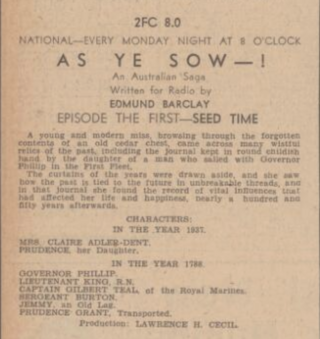
As Ye Sow is a 1937 Australian radio serial by Edmund Barclay. It told the story of six generations of Australians in early colonial Australia.
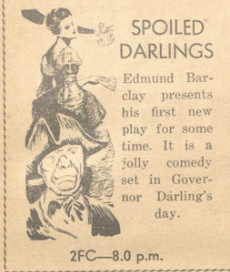
Spoiled Darlings is a 1940 Australian romantic comedy radio play by Edmund Barclay that was broadcast nationally on the ABC.

An Antarctic Epic is a 1933 Australian radio drama by Edmund Barclay about the Scott Expedition to Antarctica. It was the first radio drama script by Barclay who went on to become arguably Australia's leading radio writer.
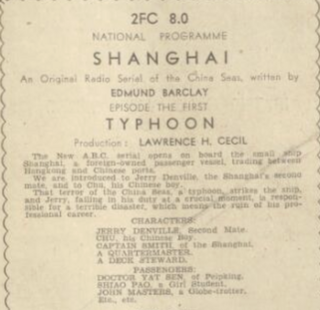
Shanghai is a 1936 radio serial by Edmund Barclay. It ran for 26 weeks.
Khyber is a 1935 Australian radio serial by Edmund Barclay set in the north west frontier of India. According to contemporary reports "Undoubtedly it has proved one of the most successful serials ever broadcast in Australia or any part of the world."
Mingled Yarn is a 1937 Australian radio play by Edmund Barclay about the life of William Shakespeare. It was broadcast on the ABC for Australian Drama Week.
Merry-Go-Round is a 1936 Australian radio play by Max Afford. It won first prize in the ABC Radio Contest for best play.
Henry Lawson Stories was a name given to a series of 1937 Australian radio plays on the ABC where Edmund Barclay adapted stories of Henry Lawson.
Into the Light is a 1938 Australian radio serial by Edmund Barclay. It followed on from this success with As Ye Sow.
Dead or Alive is an Australian radio serial by Edmund Barclay. The series was a follow up to Barclay's successful serial Khyber.
Singapore Spy is a 1939 Australian radio drama serial from Edmund Barclay set in Singapore. It was an adventure serial in the vein of his earlier works Khyber and Shanghai.
Valley of the Sky is a 1937 Australian novel by Tarlton Rayment that was based on the life of Angus McMillan.
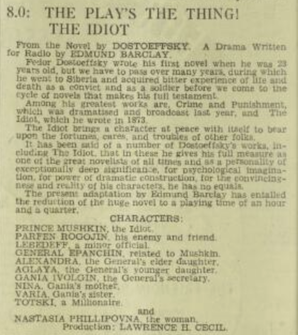
The Idiot is a 1938 Australian radio drama. It was adapted by Edmund Barclay from the novel The Idiot by Fyodor Dostoevsky.
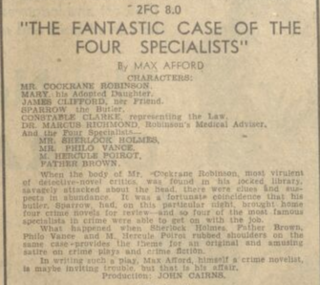
The Fantastic Case of the Four Specialists is a 1937 Australian radio play by Max Afford. The play was one of Afford's best known.
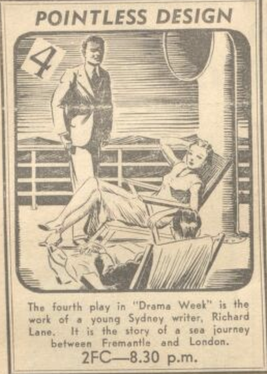
Pointless Design is a 1938 Australian radio play by Richard Lane. It was Lane's first notable radio work although his second one produced. It was inspired by Lane's travels to Europe.
Canberra the Great is a 1938 Australian radio drama by Edmund Barclay that celebrated the history of Canberra.
Wheat Boat is a 1942 Australian radio play by Alexander Turner. It was bought for the ABC.

Lovelace is a 1934 Australian radio play by Edmund Barclay. It was inspired by the real life Colonel Richard Lovelace but heavily fictionalised.
The Black Horse is a 1937 Australian radio play by Vance Palmer based on his 1923 short play of the same name.








